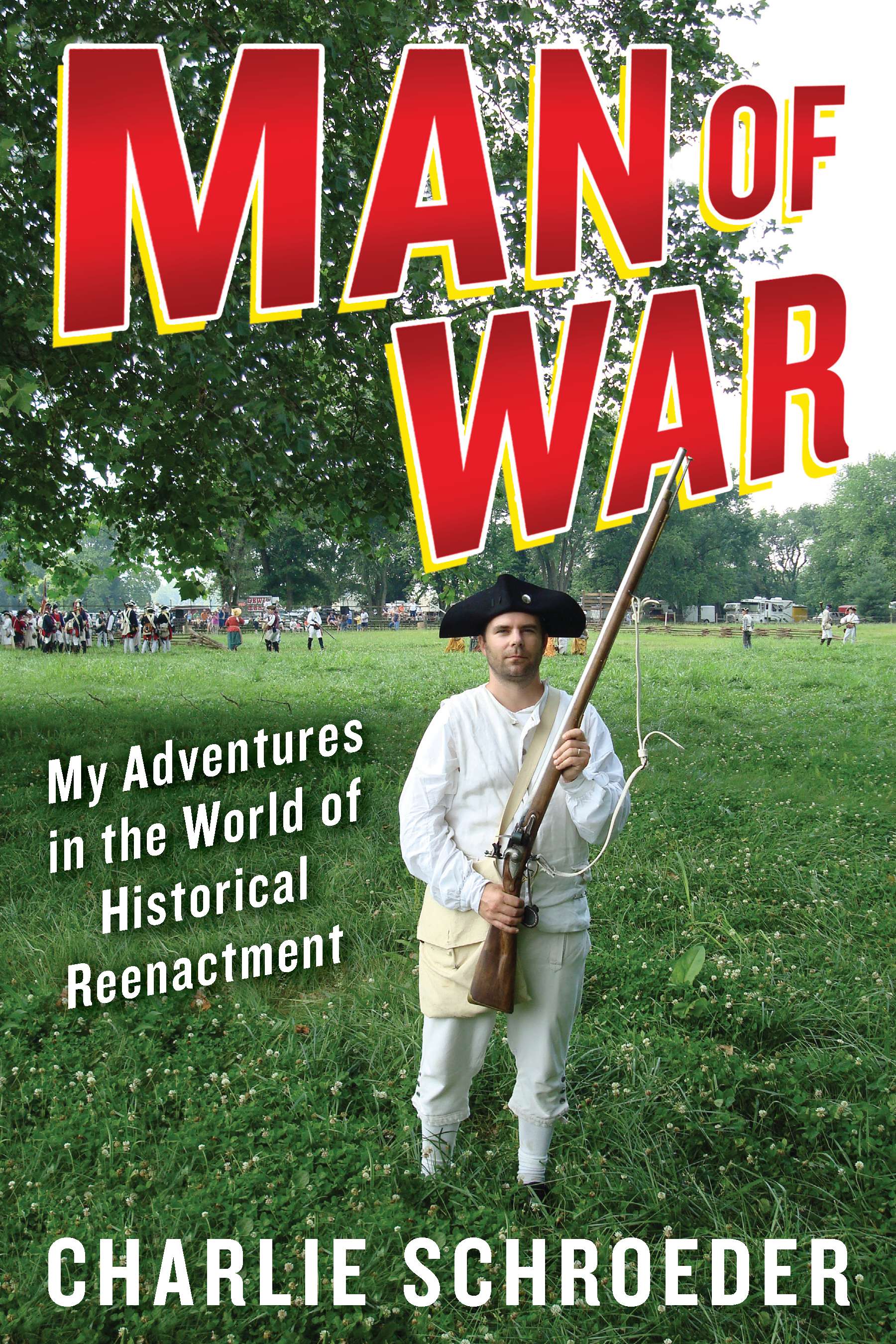
“I feel like poetry gets mislabeled as a high art that’s exclusionary in some way,” says Gabriel Fried ’96, a poet, teacher, and poetry editor. “Rob made things intimate, but he was never exclusionary. If you wanted in, you got admitted in.”
“Rob” is Rob Farnsworth, retiring after this academic year as senior lecturer in English. Author of three poetry collections, poetry editor for seven years of the quarterly American Scholar, and founder of the creative writing program and the Literary Arts Live reading series at Bates, he was a mentor to Fried — and to many others who have studied poetry, both the reading and the writing of it, with Farnsworth during his 26 years here.
On Feb. 12, Literary Arts Live presented Fried and two other alumni poets at the Muskie Archives for a reading and a tribute to that longtime champion of creative writing at Bates. Farnsworth himself had offered an LAL reading three weeks earlier.
Rob Farnsworth reads his poem “Vagrancy” during the Literary Arts Live session on Jan. 25 in Muskie Archives. An homage to W.B. Yeats, whose poem “The Wild Swans at Coole” Farnsworth references, the poem is about the “specific, anonymous, reorienting pleasures of solitary travel.”
Joining Fried were Christian Barter ’90 and Craig Morgan Teicher ’01. Barter didn’t study with Farnsworth, but they are friends who met when Farnsworth published Barter in The American Scholar. Barter’s latest published collection is Bye-bye Land, which received the Isabella Gardner Prize. A trail crew supervisor at Acadia National Park, he served as the park’s poet laureate during its centennial year, 2016.
Teicher is director of special editorial projects at Publishers Weekly, teaches creative writing at New York University, is a literature and music critic, and has published four books. Brenda Is in the Room was awarded the Colorado Prize for Poetry.
And Fried is poetry editor for Persea Books and an assistant professor of English at the University of Missouri, and has published two poetry collections. His Making the New Lamb Take was named a Best Book of 2007 by the St. Louis Post-Dispatch.
During their Bates visit, the trio talked with us about cold weather at Bates, reasons for making poetry — and, of course, Rob Farnsworth.
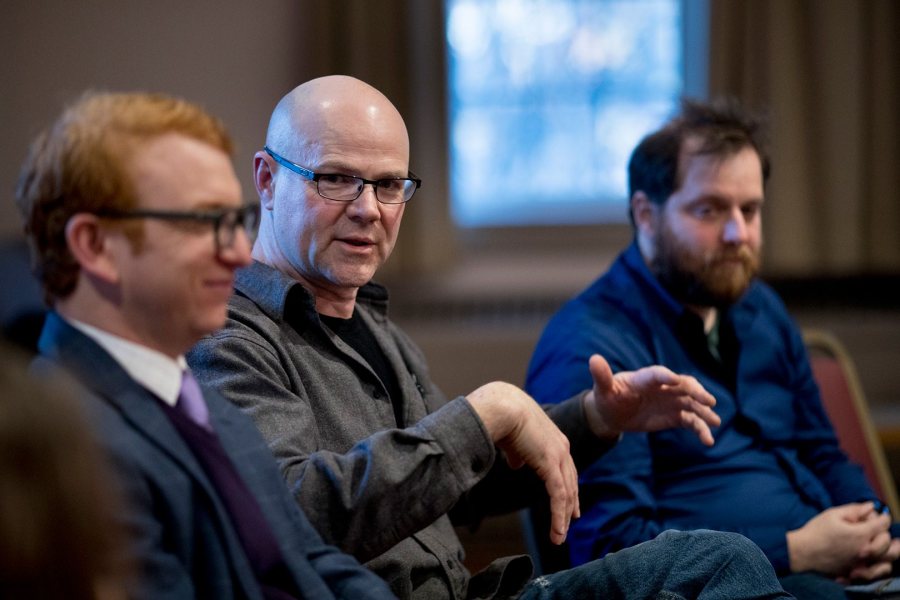
Christian Barter ’90, at center, makes a point while fellow poets Gabe Fried ’96, at left, and Craig Morgan Teicher ’01 listen. Visiting Bates for an evening poetry reading on Feb. 12, they met with students in the Muskie Archives during the afternoon. (Phyllis Graber Jensen/Bates College)
Christian, you barely overlapped with Rob when you were here. How did you get to know him?
Barter: A teacher I had in graduate school, poet Sydney Lea, told me that Rob was the poetry editor at The American Scholar — “I think he’d like your work, maybe you should send him some poems.” So Rob took a couple poems of mine. A few years after that, when my first book came out, he asked me if I’d like to read at Bates. And then I got to meet him in person, and of course immediately liked him.
Craig and Gabe, what are some early impressions from studying with Rob?
Teicher: For me, very clearly, it was Rob’s way of teaching, which was to ask us questions very articulately, and then to hold us to a high standard as to how we answered them. It deeply matched the reason I got into poetry in the first place, which was the need to put things into my own words all the time — just to try to get something said that I didn’t think anybody was listening to.
I was amazed to realize there was a man who taught that way and that I could take classes with him. I was like, “Oh, if this is what poetry is for, then I want to do it.” Then I just took every class I could with Rob, and we’ve stayed friends since.
Fried: I don’t know if I have ever met a more perfect teacher of undergraduates. He would recognize something in an incipient writer that they wouldn’t even know themselves was impressive, and he’d focus on that rather than on all the things that could be fixed or changed.
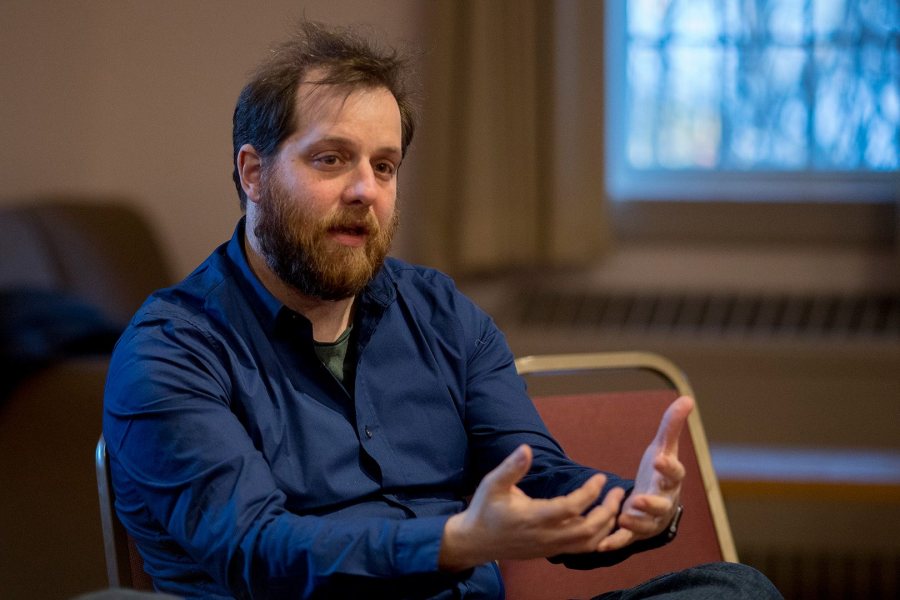
Shown gesturing for emphasis during the Feb. 12 poets’ gathering with students, faculty, and staff, Craig Morgan Teicher ’01 has published four books of poetry and prose. (Phyllis Graber Jensen/Bates College)
Is Rob present in your teaching?
Teicher: Exclusively and always. I had a marvelous 10th-grade English teacher who also taught by summoning articulate responses, and Rob showed me a more mature version of that. And that’s the only way that I know how to teach — basically I sit down in a room with a book and start asking questions.
Fried: To really listen to how students are responding, to help them know what questions to ask of a poem, but then to let them do the asking and to underscore the ways in which they have made important observations about a poem — that all comes from Rob.
How have your reasons for writing poetry evolved over the years?
Barter: At first, I was writing very much day-to-day poems of observation. For better or worse, I’m now writing more with a world view in mind and more consciously trying to tackle larger issues in my work, though always grounded by real-life things. I’ve become very interested in writing topical poems about climate change and the political atmosphere in which we live, and that kind of thing.
Teicher: Getting married and having kids really changed what I thought poetry was for. My son has pretty severe cerebral palsy, and so most of my latest book, The Trembling Answers, comes out of a period five or six years ago when he was severely medicalized. It was a period of having a lot of experiences that only my wife and I could share. Again, it’s that thing of having to say something that you need to have understood, so you need to find a way of explaining it such that people might be able to understand it.
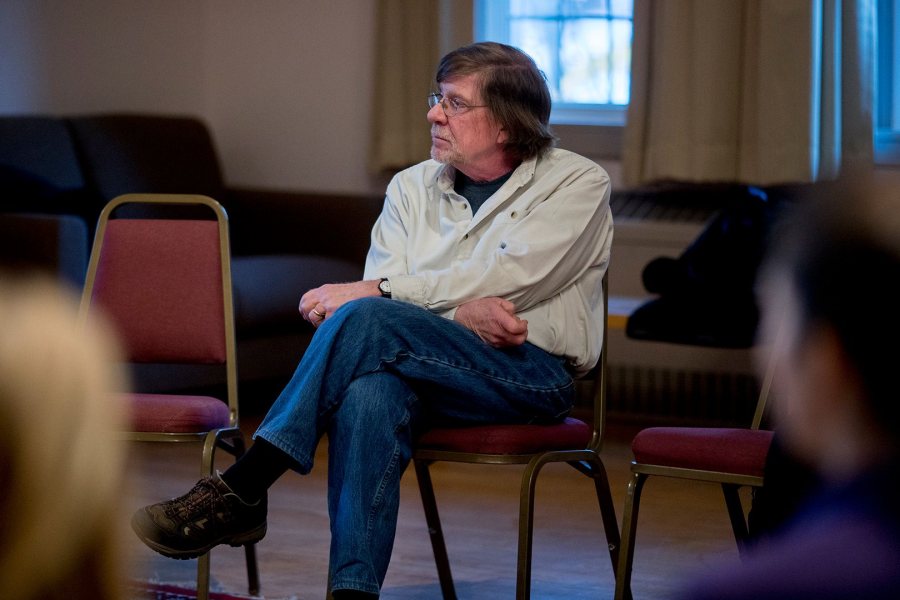
Poet Rob Farnsworth was among the listeners in the Muskie Archives as three alumni poets, including two of his former students, talked with students, staff, and faculty on Feb. 12. (Phyllis Graber Jensen/Bates College)
Fried: Writing poems made sense to me, because I loved to play with words, shift them around and make noises with them. But my impetus for writing poems has always been to try to figure out nostalgia, feelings of memory and longing, and trying to parse how much of that is self-generated and how much of it comes out of the initial experiences that we’re nostalgic for.
Anything you’d like to add about your Bates education overall, or your feelings about visiting?
Barter: I needed to grow up more than many when I got here. I started here at 17 and my first year was pretty rough. But then I found my people, which is where so much of it begins for all of us. And that was just a wonderful blessing and that’s the wonderful thing about Bates — you can find your people here.
As far as me becoming an artist, it was a process of learning how to be disciplined and learning how to be effective. That happened largely through learning to compose music, and Bill Matthews was a big part of that for me as my mentor. He taught me a lot, not just about writing music, but about being an artist and what it takes to actually make something as an artist, and not just dream.
Teicher: I was looking around today and realizing that there’s nowhere that I can look here that doesn’t give me a strong memory of something that happened. And to me, the students look really similar to my peers. And that may be just because they’re just as cold as we were and therefore bundled up in similar clothing.
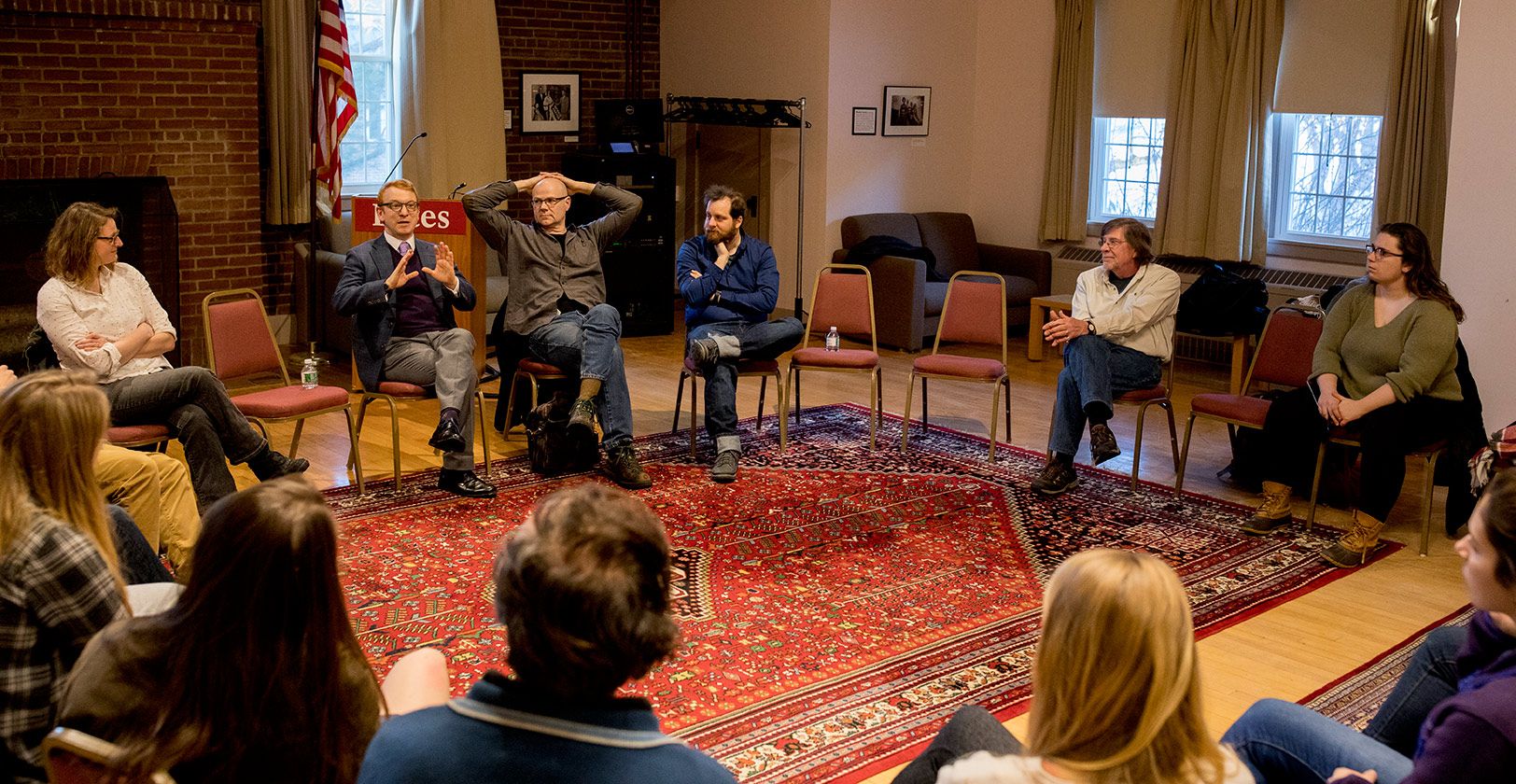
Poet Gabe Fried ’96 answers a question from the audience as Christian Barter ’90 and Craig Morgan Teicher ’01 look on. Fried’s classmate and Lecturer in English Jess Anthony, at left, and Senior Lecturer in English Rob Farnsworth, in white shirt, presented the three poets at Bates on Feb. 12. (Phyllis Graber Jensen/Bates College)


